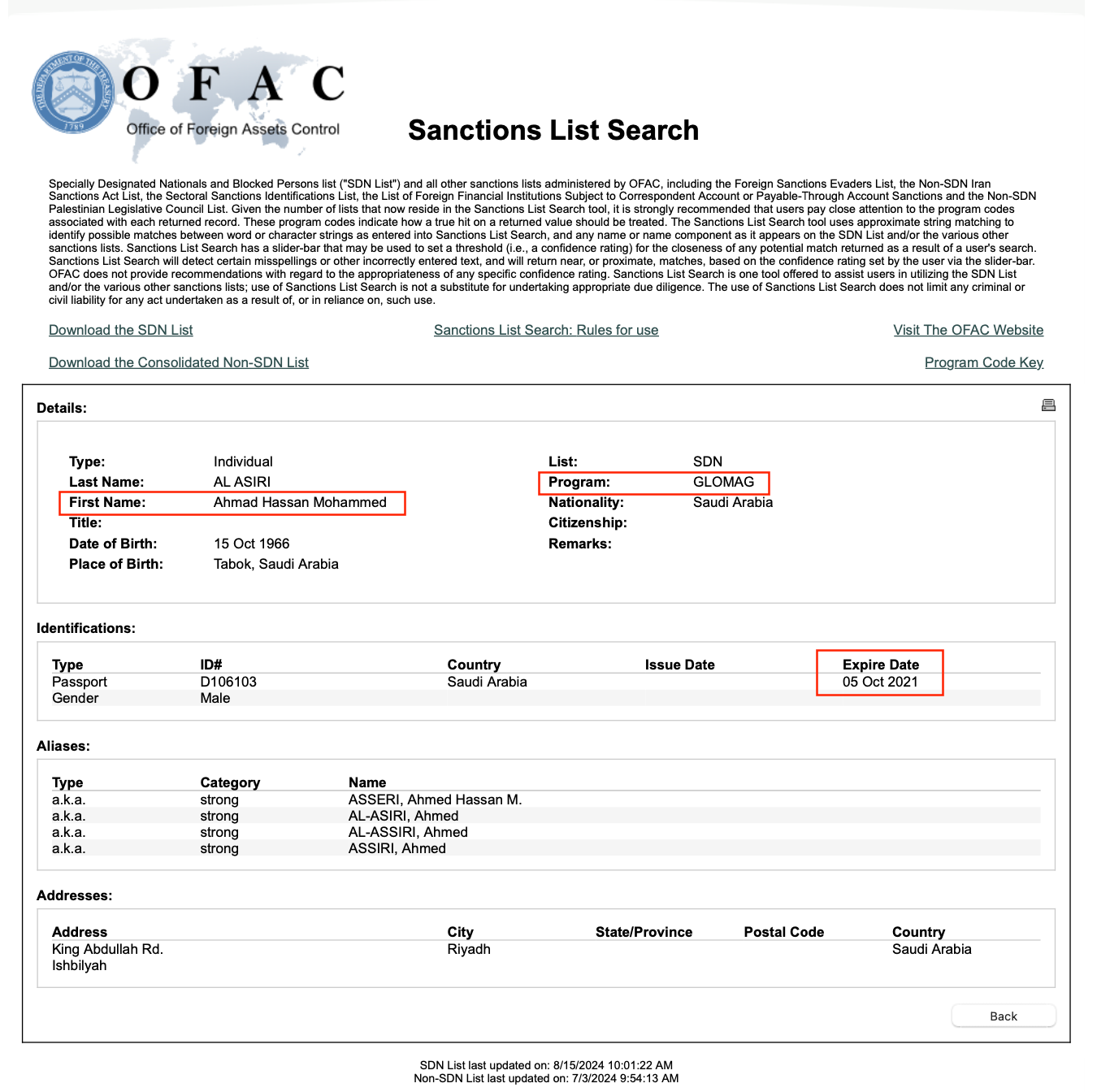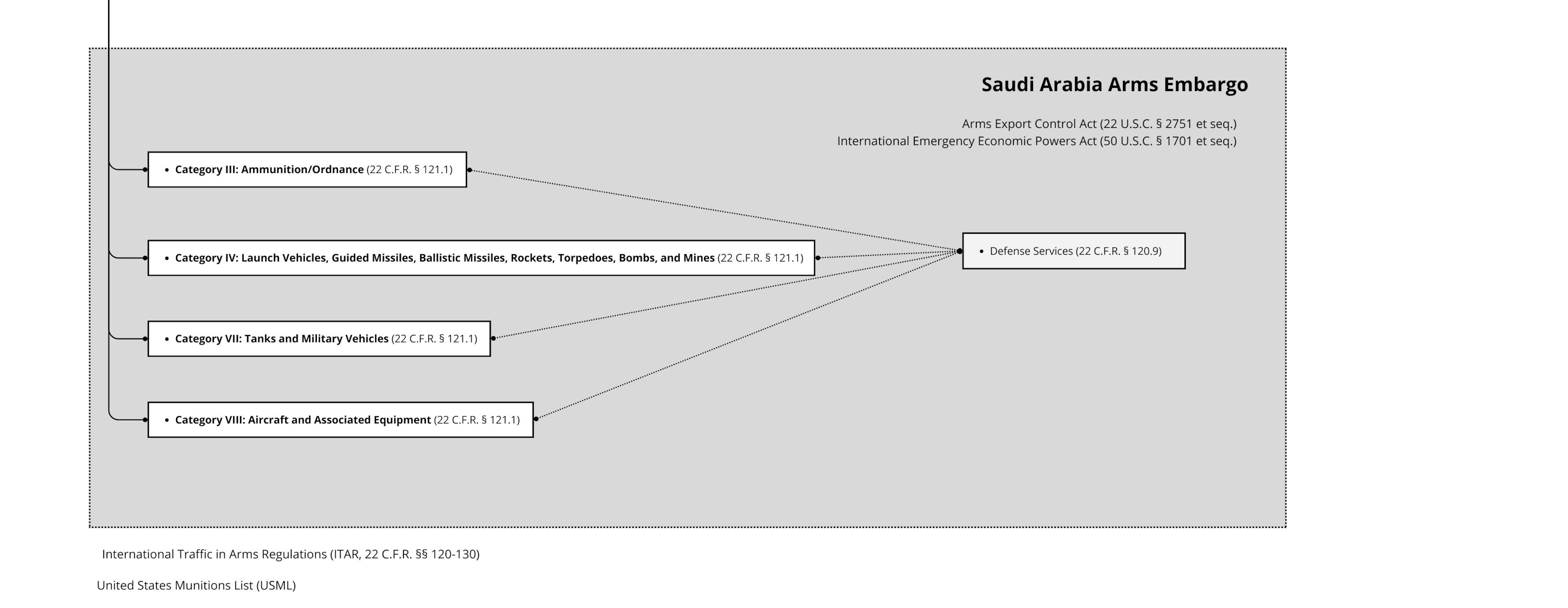Saudi Arabia Sanctions
Sanctions against Saudi Arabia are not just another news item but a significant signal to the business community. In response to violations of international norms and the murder of Jamal Khashoggi, the world has seen that even key players are not immune from consequences. However, sanctions are not merely about punishment; they represent a new reality in which businesses must operate. For those with interests in the region, it is crucial to understand how these measures can impact your operations. Ignoring sanctions means risking non-compliance and significant consequences, while understanding them means staying one step ahead.
Why Sanctions Were Imposed on Saudi Arabia?
As previously discussed, U.S. sanctions were imposed in response to the murder of Jamal Khashoggi, and additional sanctions were introduced in reaction to Saudi Arabia’s military actions in Yemen, several members which resulted in significant civilian casualties (see “Arms Embargoes” for more details). Both sets of measures require particular caution and attention.
The murder of Jamal Khashoggi marked a turning point in relations with Saudi Arabia. Khashoggi, a prominent journalist and critic of the Saudi regime, had long been close to the Saudi elite, but his outspoken criticism of the regime’s repressions forced him to leave the country and seek refuge in the United States. However, on October 2, 2018, upon entering the Saudi Consulate in Istanbul, he did not emerge alive. The murder was a cold-blooded and meticulously planned operation orchestrated at the country at highest levels.
Central to this operation were Ahmad Hassan Mohammed al Asiri (Asiri), former Deputy Head of the Saudi General Intelligence Directorate, and his associate Saud al-Qahtani. They dispatched an elite Saudi Rapid Reaction Force, also known as the “Tiger Squad,” to eliminate Khashoggi. Their actions provoked an international scandal and led to the imposition of U.S. sanctions on Saud Al-Qahtani, Maher Mutreb, Salah Tubaigy, Meshal Albostani, Naif Alarifi, Mohammed Alzahrani, Mansour Abahussain, Khalid Alotaibi, Abdulaziz Alhawsawi, Waleed Alsehri, Thaar Alharbi, Fahad Albalawi, Badr Alotaibi, Mustafa Almadani, Saif Alqahtani, Turki Alsehri, and Consul General Mohammed Alotaibi (as of 2024 Some individuals have been removed from the SDN sanctions LIST however). Assets of al-Asiri and the Rapid Reaction Force were frozen, and their access to U.S. financial systems was blocked. This was a clear message that human rights violators and those who believe they can act with impunity will be held accountable, regardless of their power or status. Another example of companies which fell under the OFAC sancions are itqan-realestate.com and arabisc-haram.com.

Executive Order 13818 explicitly states that serious human rights abuses and corruption constitute an “extraordinary and unusual threat” to the national security, foreign policy, and economy of the United States (E.O. 13818, December 20, 2017, Sec. 1).
Saudi Arabia Sanctions Regime
The sanctions regime against Saudi Arabia encompasses several key areas, each of which is strictly regulated by statutory provisions and OFAC regulations. It is important to understand that these sanctions apply not only to state entities but also to members of the private sector and individuals, making them highly relevant for companies and individuals conducting business with Saudi Arabia.
The basis for the sanctions against Saudi Arabia is Executive Order 13818, signed by President Donald Trump on December 20, 2017. This order was issued under the expanded authorities provided by the International Emergency Economic Powers Act, 50 U.S.C. §§ 1701-1706, the National Emergencies Act, 50 U.S.C. §§ 1601-1651, and the Global Magnitsky Human Rights Accountability Act, Public Law 114-328. The sanctions imposed under this order target the blocking of assets and the cessation of activities of individuals involved in severe human rights abuses and corruption worldwide, not limited to Saudi Arabia. This order is fundamental to sanctions against Saudi Arabia as it allows the U.S. government to freeze assets, impose financial and visa restrictions on, and bar entry into the country for those involved in human rights violations, both domestically and abroad.
Additionally, the aforementioned embargo measures were implemented pursuant to the Arms Export Control Act (22 U.S.C. § 2751 et seq.) and the International Emergency Economic Powers Act in response un sanctions due to involvement in the Yemen conflict and will be explored in more detail later in the context of Saudi Arabia sanctions.
Economic Sanctions
Economic sanctions are at the core of the sanctions regime against Saudi Arabia. According to Sec. 1(a)(i-iii) of E.O. 13818, all assets and property interests of individuals and entities involved in human rights violations or corruption are subject to freezing. This includes not only direct involvement in such actions but also material support, provision of goods or services, or any other assistance that facilitates unlawful activities (E.O. 13818, December 20, 2017, Sec. 1(a)(ii)(A-D)). These sanctions apply to those who assist, sponsor, or support individuals engaging in human rights violations or corruption. It is important to note that these measures have a global scope: they are applicable to any person or entity subject to U.S. jurisdiction. Companies and individuals engaged in international business must closely monitor their counterparts and business partners to avoid becoming targets of secondary sanctions.
For entities engaged in cross-border investment activities with a focus on Saudi Arabia, proactive management of sanctions risks in strict compliance with OFAC regulatory requirements is essential.
Arms Embargoes
The arms trade embargo imposed by the United States against Saudi Arabia is another crucial element of the sanctions regime, based on several key statutes that provide the legal foundation for its implementation. These include the Arms Export Control Act (22 U.S.C. § 2751 et seq.) and the International Emergency Economic Powers Act (50 U.S.C. § 1701 et seq.), which grant the U.S. President the authority to impose restrictions on the export of arms and related services. These acts govern export operations involving categories of arms listed in the United States Munitions List (USML) and are subject to the International Traffic in Arms Regulations (ITAR, 22 C.F.R. §§ 120-130).
Specifically, the embargo against Saudi Arabia covers the export and transfer of arms under Category III: Ammunition/Ordnance (22 C.F.R. § 121.1), Category IV: Launch Vehicles, Guided Missiles, Ballistic Missiles, Rockets, Torpedoes, Bombs, and Mines (22 C.F.R. § 121.1), Category VII: Tanks and Military Vehicles (22 C.F.R. § 121.1), and Category VIII: Aircraft and Associated Equipment (22 C.F.R. § 121.1). As is customary, restrictions on the supply of these types of arms also encompass services defined in Defense Services (22 C.F.R. § 120.9), such as training, technical support, modernization, and transfer of technologies related to these categories of arms.


In the event of restrictions on arms sales due to the arms embargo, our attorneys will provide your company with necessary legal support to adapt to the new conditions introduced in 2024 and minimize sanctions risks.
Contact us for issues related to the embargo.
Travel Bans
The travel ban to the United States pertains to individuals involved in serious human rights violations. According to Sec. 2 of E.O. 13818, entry into the U.S. for such individuals, including immigrants and non-immigrants, is suspended as it poses a threat to U.S. interests. These measures are designed to prevent human rights violators from seeking refuge in the U.S. or using American resources for their purposes (E.O. 13818, December 20, 2017, Sec. 2).
It is important to note that the travel ban to the U.S. may be further extended if an individual is suspected of involvement in corruption or other illegal activities. This ban includes not only denial of entry but also the revocation of previously issued visas, making it a powerful tool to pressure those officials who violate international norms.
Asset Freezes
Asset freezes are perhaps the most effective tool within the sanctions regime. According to Sec. 1(a) of E.O. 13818, all assets of individuals and entities subject to sanctions, including bank accounts, real estate, and other property rights, are subject to freezing. These assets are blocked within the U.S. and in American financial institutions, making their use or transfer impossible (E.O. 13818, December 20, 2017, Sec. 1(a)(ii)(A-D)).
This mechanism not only impedes business operations for sanctioned individuals and organizations but also prevents their access to global financial markets, as many international transactions go through American banks. Asset freezing is a strong signal that the U.S. government is prepared to take the most stringent measures to ensure compliance with human rights standards.
OFAC General License
Despite the strictness of the sanctions regime, OFAC provides for the issuance of general or specific licenses, which allow for certain activities otherwise prohibited under sanctions list under normal circumstances. According to Sec. 1(b) of E.O. 13818, such licenses may be issued for humanitarian aid, the supply of medications and other essential goods, and other cases that allow for mitigating the impact of sanctions in critically important areas (E.O. 13818, December 20, 2017, Sec. 1(b)).
Our OFAC attorneys have deep knowledge and experience in obtaining OFAC licenses. We conduct a thorough analysis of your activities to determine the feasibility of obtaining a license for your company. We handle the licensing process at all stages, ensuring compliance with all requirements and minimizing the risk of denial.
Penalties for Sanctions Violations
Violation of the OFAC sanctions regime can have catastrophic consequences. Under 50 U.S.C. § 1705 and Sec. 5(a-b) of E.O. 13818, any actions aimed at evading or circumventing sanctions authorities are considered illegal and can result in severe fines, asset seizures, and even criminal prosecution with imprisonment for up to 20 years (E.O. 13818, December 20, 2017, Sec. 5(a-b)).
We understand that compliance with sanctions laws can be challenging, especially for many international organizations and companies with global operations. Our attorneys assist clients in developing and implementing internal sanction compliance systems, auditing current operations, and advising on risk mitigation.
Controversies in Sanctions Against Saudi Arabia
The issue of sanctions against Saudi Arabia is not a simple black-and-white scenario. On one side, there is the drive to penalize violations of international norms. On the other, there are risks of imposing sanctions impacting ordinary people and the country’s economy. Critics rightly point out that wealthy countries can easily circumvent sanctions through other markets, which may undermine diplomatic efforts.
Targeted sanctions—such restrictive measures such as asset freezes and travel bans—can exert pressure on decision-makers. However, this is a delicate balance. Broad sanctions, if misapplied, can backfire, leading to unintended consequences and complicating the resolution of the issues they aim to address.
Sanction decisions should be well-considered and strategic. It is not a matter of morality or politics but of cold calculation: how to achieve the objective with minimal collateral damage and maximum impact.
OFAC Sanctions Lawyers
Dealing with sanctions requires a strategic approach and in-depth legal analysis. Our sanctions lawyers possess high specialization and extensive experience in sanctions law. We provide a full range of services—from risk assessment and license acquisition to defense against OFAC claims and other regulatory bodies impose sanctions.
Contact us for professional support and protection in complex sanctions situations.


